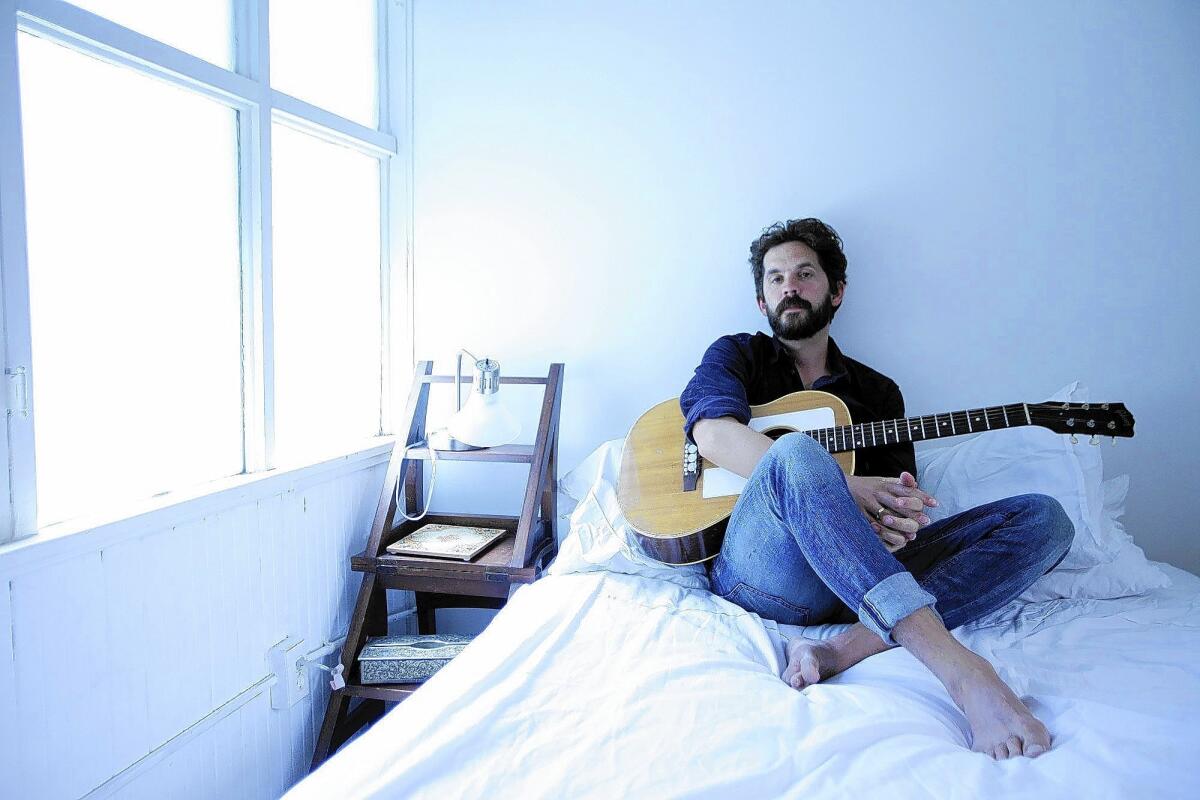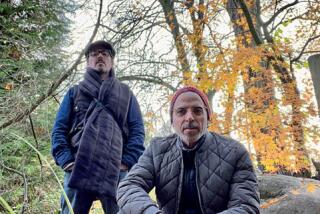Norwegian pop star Thomas Dybdahl uses L.A. as his lab

- Share via
Thomas Dybdahl remembers the moment he knew his new album was going to be something special.
A real-deal pop star in his native Norway, the 35-year-old singer had come to Los Angeles to do what all real-deal pop stars eventually do: experiment with his working method.
Instead of assembling his songs piece by piece, playing many of the sounds himself in a home-studio setting, he was collaborating with a name producer, Larry Klein, and Klein’s posse of first-call session players.
“I didn’t want to make another jigsaw record,” Dybdahl said, referring to the patched-together process that nonetheless yielded a string of radio hits and No. 1 albums at home. “On those records it was a matter of using what you’ve got — and I didn’t have too much.”
In a session at West L.A.’s storied Village Recorder, though, he had Jay Bellerose, a drummer who’s motored songs by everyone from Elton John to Audra McDonald and was now laying the foundation for Dybdahl’s song “This Love Is Here to Stay.”
“To just sit there and watch Jay ponder as I talked, then go out to his kit and start building a groove — to me that was amazing,” he said. “I was floored by that.”
Months later, that groove is grabbing others: The first track on Dybdahl’s just-released “What’s Left Is Forever” album, “This Love Is Here to Stay,” turned up recently on Showtime’s “House of Lies” and landed on the series’ soundtrack alongside cuts by Gary Clark Jr. and Aloe Blacc.
It spins regularly on KCRW-FM, the taste-making Santa Monica public radio station. And last week the polished R&B tune drew a big response during Dybdahl’s gig at Hotel Cafe, where he’s set to conclude a month-long residency on Wednesday night.
With its breathy, close-miked vocals and sumptuous folk-soul textures, “What’s Left Is Forever” fits neatly into Dybdahl’s body of solo work, which stretches back over a decade to his 2002 debut; this album isn’t the creation of Bellerose, Klein or any of the other heavyweight session guys — including bassist David Piltch and guitarist Dean Parks — who worked on it.
But those players undeniably left a mark.
“I had heard the musicians Thomas had been playing with in Norway, and they were good,” said Klein, known for his work with Herbie Hancock and Joni Mitchell, among others. (In addition to producing “What’s Left Is Forever,” Klein released the album through his Strange Cargo label.) “But I had a feeling that being thrown into this new situation with these other musicians would just up his game. And I think it did.”
Now that it’s done, the album is profiting too from an alignment with the wider musical world. Where the smooth tones and gentle rhythms of Dybdahl’s earlier efforts seemed to come from nowhere (at least to those outside Norway), his latest shares a soft-touch vibe with work by hipster-beloved acts like Quadron and L.A.’s Rhye; it even feels related to the delicate new Coldplay disc.
“House of Lies” music supervisor Chris Douridas said the “timeless” quality of Dybdahl’s material — which he compared to that of Harry Nilsson and Leonard Cohen — means it will occasionally come into vogue “the way the best songwriters’ stuff does.”
“Look at Joni Mitchell,” he went on. “Her stuff resurfaces, then retreats to the background, then bubbles back again. It’s a rare quality you don’t see much of anymore.”
Dybdahl, who picked up the guitar at age 10 after an American family moved in next door to his in the coastal oil town of Stavanger, claimed to be only vaguely aware of the younger acts who’ve found success with a sound he’s been honing for years.
“Yeah?” he said when told over lunch at a Venice eatery that all of a sudden his music feels au courant. “That might be good for me. I wouldn’t stand in the way of that.” (Of his fashionably mellow vocals, he shrugged: “There’s no way I can rough this up — it’s just the way it is.”)
Yet he’s clearly putting more effort into building a fan base in this country than he has before. After recording much of the album in Los Angeles, he moved back here with his wife and 6-year-old son for the duration of his Hotel Cafe gig. And he’s kept busy between shows writing and recording with other musicians; last week he played a new song he said even the members of his band hadn’t heard before.
“He’s a hard worker,” said Klein, who added that Dybdahl always says yes when Klein asks him to contribute to other Strange Cargo projects.
His goal, the singer said, is not necessarily to be a superstar here, an experience he gets enough of in Norway, where upon his return next month he’s scheduled to play an outdoor concert backed by a symphony orchestra.
Rather, he’s focused on establishing the traction required to tour dependably and to undertake more musical experiments like the one that resulted in “What’s Left Is Forever.”
A steady-gigging professional long before his recent collaboration with Klein and his cronies, Dybdahl still said he found their work ethic inspiring.
“The everyday life of a musician — it’s really something to do.”
More to Read
The biggest entertainment stories
Get our big stories about Hollywood, film, television, music, arts, culture and more right in your inbox as soon as they publish.
You may occasionally receive promotional content from the Los Angeles Times.











